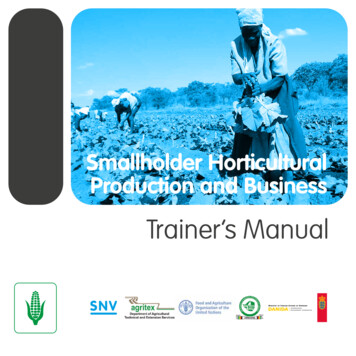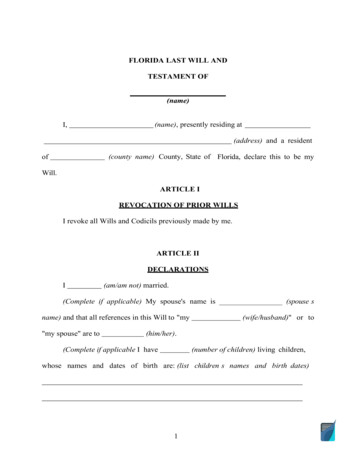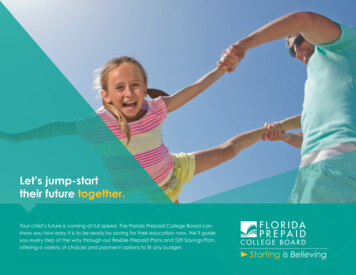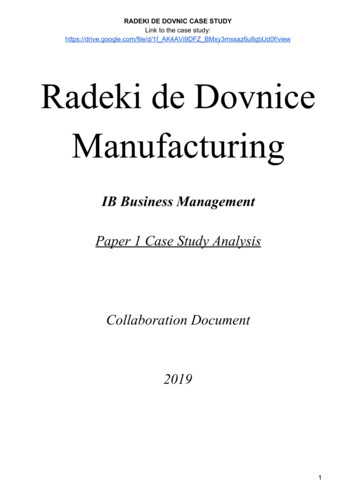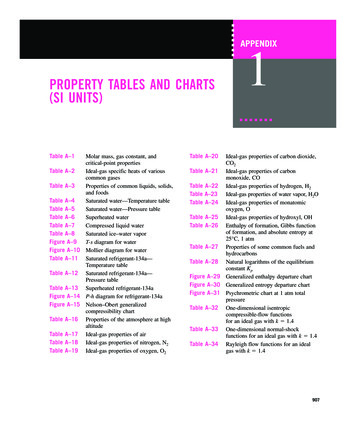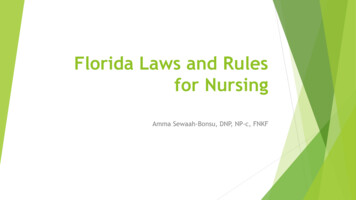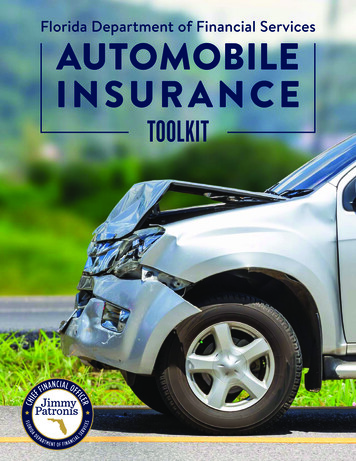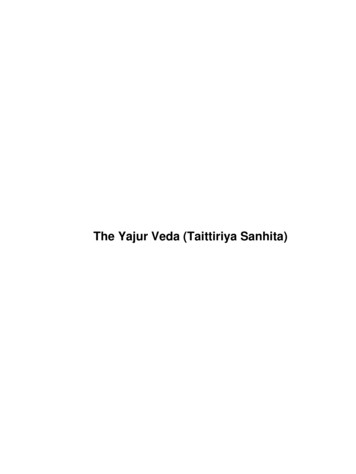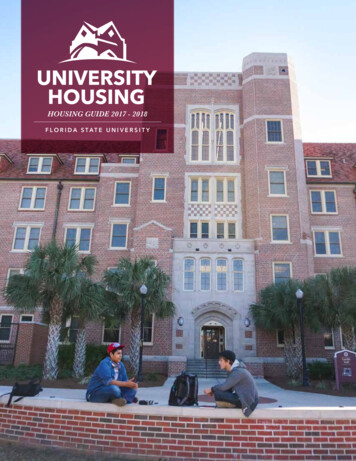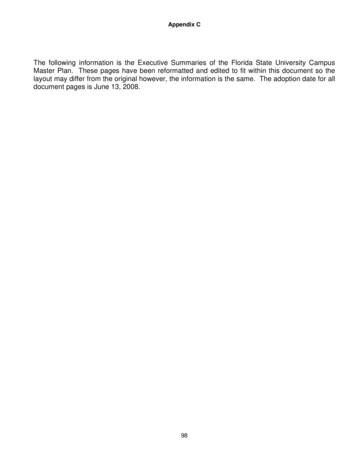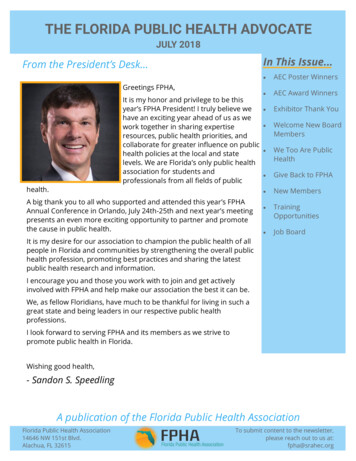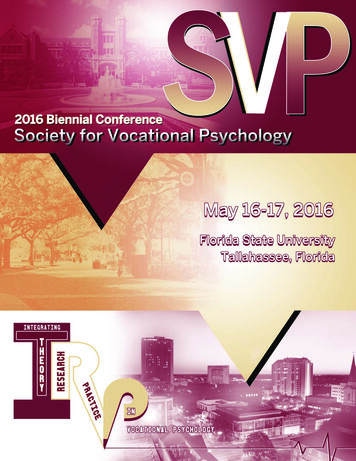
Transcription
1
2
Table of ContentsWelcome from the Society for Vocational Psychology Conference Chair.4Welcome from the 2016 Conference Committee.5Society for Vocational Psychology Board.6Society for Vocational Psychology Previous Chairs.7Sponsors.8Acknowledgments.9Schedule at a Glance.10Conference Agenda (Plenary Panels/90-Minute Presentations/Roundtables/Poster Presentations).11Conference Meeting Space.29Society for Vocational Psychology 2016 Conference Publication.31Campus/Local Information.33Dining Options.35Context and Perspectives on the 2016 Conference Setting.36Notes.373
Welcome from the SVP ChairWelcome to the SVP 12th Biennial Conference. We are so excited that you decided to attend.On behalf of the SVP executive board, I want to send our gratitude and appreciation for all of the hard work of Drs.Janet Lenz, Casey Dozier, Deb Osborn, Gary Peterson, Bob Reardon, Jim Sampson, and Emily Bullock-Yowell.They have worked tirelessly to set up the wonderful accommodations and list of speakers and events for thisconference.Throughout my career ever since I was a graduate student, I have attended the SVP Biennial Conferences. I havefound them to be an event that focuses on fostering the understanding and development of scholars at all levels whoare interested in vocational psychology and career counseling.I believe this conference will be an important event that will help us facilitate understanding across research, theory,and practice and will provide an opportunity for all who are interested in helping people find and maintain gainfulemployment. I look forward to meeting with many of you over the course of this conference. Thank you forattending.Saba Rasheed AliSaba Rasheed Ali, Ph.D.Chair, Society for Vocational PsychologyAssociate Professor, Counseling PsychologyUniversity of Iowa4
Welcome from the 2016Conference CommitteeOn behalf of the 2016 Society for Vocational Psychology (SVP) Conference Committee, we are delighted towelcome you to Tallahassee, Florida and Florida State University for this year’s conference focusing on IntegratingTheory, Research, & Practice. The conference committee has worked hard to bring you a diverse array of stimulatingand interesting plenary, program, roundtable, and poster sessions.Enjoy this opportunity to expand your knowledge in the field of vocational psychology, network with colleagues,and make new connections. We hope the conference provides you with rich ideas to take home and further extendsthe connections between theory, research, and practice. Take time to enjoy the local scenery, food, cultural activities,Tallahassee’s southern hospitality and the surrounding areas. Don’t hesitate to ask if we can be of assistance. Thanksfor being part of this year’s conference.Janet G. Lenz, Ph.D.Conference ChairAssociate-In ProfessorEducational Psychology & Learning SystemsCareer Center Program Director for Instruction,Research & EvaluationFlorida State UniversityEmily Bullock-Yowell, Ph.D.Associate ProfessorDepartment of PsychologyDirector of Training, Counseling Psychology MSProgramUniversity of Southern MississippiV. Casey Dozier, Ph.D.Career Center Program Director for Career Advisingand CounselingFlorida State UniversityDebra Osborn, Ph.D.Associate ProfessorEducational Psychology & Learning SystemsCo-Director, Center for the Study of Technology inCounseling & Career DevelopmentFlorida State UniversityGary Peterson, Ph.D.Professor EmeritusEducational Psychology & Learning SystemsSenior Research Associate, Center for the Study ofTechnology in Counseling & Career DevelopmentFlorida State UniversityRobert C. Reardon, Ph.D.Professor EmeritusEducational Psychology & Learning SystemsSenior Research Associate, Center for the Study ofTechnology in Counseling & Career DevelopmentFlorida State UniversityJames P. Sampson, Jr., Ph.D.Professor/Associate DeanCollege of EducationCo-Director, Center for the Study of Technology inCounseling & Career DevelopmentFlorida State University5
Society for Vocational PsychologyBoardSaba Rasheed Ali, ChairUniversity of IowaPatrick Rottinghaus, Chair-ElectUniversity of Missouri at ColumbiaSusan Whiston, Past-ChairIndiana UniversityNeeta Kantamneni, Communications OfficerUniversity of Nebraska-LincolnMarie Hammond, TreasurerTennessee State UniversityHoward E. A. (Tony) Tinsley, WebmasterWestern Washington UniversityEleanor Castine, Student RepresentativeBoston UniversityBrittan L. Davis, Student RepresentativeCleveland State University6
Society for Vocational PsychologyPrevious ChairsMark Savickas, Founding Chair (1987-1996)Linda Subich (1996-1998)Nadya Fouad (1998-2000)Jane Swanson (2000-2002)W. Bruce Walsh (2002-2004)David Blustein (2004-2006)Paul Gore (2006-2008)Donna Schultheiss (2008-2010)Ellen McWhirter (2010-2012)Susan Whiston (2012-2014)Saba Ali (2014-2016)7
SponsorsThe 2016 Conference Committee is extremely grateful for the support of its sponsors.8
AcknowledgmentsAppreciation is expressed to the following persons for their support of the conference.We could not have done it without you!Carolyn BarringerJackie BelleMary BuzzettaEllie CastineChristina ColgarySean CollinsBrittan DavisKara DingessMegan DowneyChristine EdralinKatie FinneyLisa FrancisVanessa FreemanTrinity GonzalezDawn GriffinV’Rhaniku HaynesKenneth HigginsMegan HollisPei-Chun HouTex HudgensSyclair JonesJulia KronholzLauren KumeStacie KurlickMelanie LeutyErica MathisShae McCainMary-Catherine McClainLeslie MilleAdam MillerSarah PearsonRickey RiddleyKelly RiserKelvin RutledgeHeather ScarboroMartha SkipperLinnea StuttsMichele ThomasBrianna WernerCalvin Williams9
Schedule at a GlanceSunday, May 153:00-5:003-Mile Walk — St. Marks National Wildlife Refuge6:00-8:00Dutch Treat Dinner at Wakulla Springs Lodge.Limited to 50 participants.Monday, May 167:30-11:008:00-9:309:00-10:00Conference Registration —Student Services Building (SSB), 2nd FloorContinental Breakfast — SSB Room 201Career Center Tours — Dunlap Success Center10:00-10:20Welcome/Overview — SSB Room 20310:20-11:30Plenary Panel I — Challenges and Opportunitiesin Vocational Psychology for Integrating Theory,Research, and Practice11:30-11:45Break11:45-12:45Plenary Panel II — Applying CognitiveInformation Processing Theory to Career ProblemSolving and Decision Making12:45-2:00Lunch2:00-3:30Program Sessions/Roundtables3:30-3:45Travel Break3:45-5:15Plenary Panel III — Issues in Using EvidenceBased Practice5:15-5:45Travel to the University Center Club (UCC)5:30-7:30Reception and Poster Sessions — UCC7:30-untilDinner On Your Own(See list of dining options on page 35)Tuesday, May 178:00-9:009:00-10:00Continental Breakfast — SSB Room 201Break10:15-11:45Program Sessions/Roundtables10Plenary Panel V(Closing Plenary) —The State-of-the-Artin Integrating Theory,Research, and Practice5:30-6:30Optional Walk inDowntown TallahasseePlenary Panel IV — View from the Editor’s Desk:Ensuring Quality in Theory, Research, and 30Program Sessions/Roundtables2:30-2:45Break
Conference AgendaSunday, May 153:00 - 5:00 pmEarly arrivals, join us for a 3-mile walk in the beautiful St. Marks National Wildlife Refuge, located 23 miles southof Tallahassee at the Gulf of Mexico. The refuge includes coastal marshes, islands, tidal creeks, and estuaries, aswell as the second-oldest light house in Florida. The refuge provides habitat for a wide variety of migratory birdsand a diverse community of plant and animal life. The walk will be led by Dawn Griffin (Florida TrailAssociation). Please wear closed toed shoes; have a hat and jacket in case of rain. Bring your own water, bugspray, and a snack.For more information, contact Janet Lenz at (850) 545-4342, or Dawn Griffin at (850) 509-6103 or atgriffindd@aol.com. Transportation will be provided from the Doubletree Hotel and the FSU campus. Personsstaying at the FSU Ragans Hall will be picked up at 2:30 p.m. on Sunday, on Woodward Avenue on the eastside of the Dunlap Success Center; persons staying at the Doubletree will be picked up outside the lobby at2:40 p.m. You must reserve your spot in advance, no later than May 10. The walk will be limited to amaximum of 20 people.6:00 - 8:00 pmDutch treat dinner at Wakulla Springs Lodge. Limited to 50 participants. Contact Janet Lenz at (850) 545-4342for more information.11
Monday, May 167:30 - 10:30 amRegistration Student Services Building (SSB), 2nd Floor7:30 - 9:00 amContinental Breakfast Student Services Building (SSB), Room 2019:00 - 10:00 am20-minute Career Center Tours Dunlap Success Center (DSC)Sign up at the conference registration table.10:00 - 10:20 amWelcome / Conference Overview Student Services Building (SSB), Room 203Dr. Marcy Driscoll, Dean, Florida State University College of Education; Dr. Allison Crume, Associate Vice President for StudentAffairs, Florida State University; Ms. Myrna Hoover, Director, Florida State University Career Center; Dr. Saba Ali, Chair, Society forVocational Psychology; Dr. Janet Lenz, SVP Conference Chair10:20 - 11:30 amPlenary Panel I:Challenges and Opportunities for Integrating Theory, Research, and Practice in Vocational PsychologyJames Sampson, Florida State University, Introduction; Robert Lent, University of Maryland, Social-Cognitive Career Theory;Robert Reardon, Florida State University, RIASEC Theory; Mary Sue Richardson, New York University, Work and RelationshipTheory; Wendy Patton, Queensland University of Technology; Mary McMahon, University of Queensland, Systems TheoryFramework of Career11:30 - 11:45 amBreak (Enjoy refreshments) Student Services Building (SSB), Room 20111:45 am - 12:45 pmPlenary Panel II:Applying Cognitive Information Processing Theory to Career Problem Solving and Decision MakingJanet Lenz, Florida State University, Introduction; Robert Reardon, Florida State University, Origins of the CIP Approach;Gary Peterson, Florida State University, Key Concepts; Debra Osborn, Florida State University, Assessments; James Sampson, FloridaState University, Intervention Strategies; Janet Lenz, Florida State University, Training; Casey Dozier, Florida State University,Supervision; Gary Peterson, Florida State University, Evidence Related to Vocational Behavior and Career Interventions; JamesSampson, Florida State University, Cognitive Information Processing (CIP) Theory: Integrating Theory, Research, and Practice12:45 - 2:00 pmLunch ( 10 voucher provided in conference packet)Voucher may be used at any of Seminole Dining’s on-campus dining locations. Locations include SuwanneeDining Hall, Chick-fil-A, Fresh Food Company, etc. Visit px for a full listing. Explore and enjoy the FSU campus while taking a lunch break.12
Monday, May 162:00 - 3:30 pm90 Minute Presentations (choose 1 of 4 options):1-10 The SCCT in Australia: Empirical Models for Di(e)sparate IndustriesStudent Services Building (SSB), Room 208Peter McIlveen, University of Southern Queensland; Nicole McDonald, University of Southern Queensland; Brad McLennan,University of Southern Queensland; Mark Oliver, University of Southern Queensland; Harsha Perera, University of New South WalesThis program addresses the outcomes of a cluster of research projects that use the social cognitive career theory (SCCT) in an Australian contextto demonstrate the utility of the SCCT for predicting engagement and satisfaction in occupations deemed necessary for social and economicdevelopment.Program sessions 1-11 through 1-13 are all in Student Services Building, Room 214.Each set of presenters will share for 30 minutes on the topics listed below. To avoid unnecessary presentationinterruptions, please plan on staying for the full 90-minute session to hear each presenter’s session.1-11 Community and Career: A Recursive Relationship Among Social Class, Privilege, Power andWork ValuesMarie Hammond, Tennessee State University; Nancy Betz, Ohio State University; Carin Smith, Tennessee State UniversityThe current study reports on the relationship between identity, both vocational and racial-ethnic, social class, coping, SES, social capital,perceived privilege status, and demographic variables as they relate to work values. Work values were differentially related to the remainingconstructs. Implications for practice, research, and theory will be discussed.1-12 Multicultural Content in Four Major Vocational Journals: A 10-Year Content AnalysisPatton O. Garriott, University of DenverThis study will provide a content analysis of attention to multicultural issues in four major vocational journals: Journal of Career Assessment,Journal of Career Development, Journal of Vocational Behavior, and Career Development Quarterly. Trends and themes from 2005-2015 willbe summarized.1-13 A Consensual Qualitative Research on Adjusting to Retirement: Insights for Theory and PracticeAriane Froidevaux, University of Lausanne, Switzerland; Géraldine Curchod, Vaud State Service for Vocational Guidance;Saskia Degli-Antoni, University of Lausanne, Switzerland; Christian Maggiori, University of Applied Sciences & Arts, WesternSwitzerland; Jérôme Rossier, University of Lausanne, SwitzerlandThe aim of this Consensual Qualitative Research was to explore how retirees experienced their retirement adjustment process from the contextof exiting their worker role to their perceived adjustment few years later. Future directions regarding the Resource-Based Dynamic Model forRetirement Adjustment and practical implications for career counselors are suggested.
Monday, May 16Program sessions 1-14 through 1-16 are all in Student Services Building, Room 203.Each set of presenters will share for 30 minutes on the topics listed below. To avoid unnecessary presentationinterruptions, please plan on staying for the full 90-minute session to hear each presenter’s session.1-14 Career Indecision in Eastern and Western CulturesAndrea Carr, University of Missouri-Kansas City; In Heok Lee, University of GeorgiaTwo models of career indecision will be compared using data from eight countries. Research suggests a four-factor model in Western samples(Brown et al., 2012) and a five-factor model in Eastern samples (Abrams et al., 2015). Cultural sources for similarities and differences will bediscussed. Clinical implications will be explored.1-15 Career Decision-Making Profiles of Turkish AdolescentsFeride Bacanli, Gazi University; Kemal Oztemel, Gazi University; Huseyin Dogan, Meliksah University; Itamar Gati, The HebrewUniversity of JerusalemThe purposes of this research were: (a) to test the structural validity of the Turkish version of the Career Decision-Making Profile (CDMP)questionnaire and (b) to examine gender differences, and difference in decided and undecided students. Decided adolescents and females hadmore adaptive CDMP profiles than undecided adolescents and males.1-16 Development and Validation of the Career Compromise ScaleDerek Wang, University of Science and Technology of China; Daisy Hu, University of Science and Technology of ChinaThis study developed and validated a 12-item career compromise scale (CCS). Career compromise was defined as having to accept analternative that is inferior on some aspects compared to an ideal one. Using two separate samples, we first tested the reliability of the CCS, andthen conducted exploratory factor analysis and confirmatory factor analysis to examine the construct validity of the scale. Finally we conductedhierarchical regression to verify the criterion validity of CCS in relation to career satisfaction. Based on results of distinct impacts of the threedimensions of career compromise, we suggested individuals in making career decision give priority consideration to person-environment fit andgrowth opportunities, rather than the expectation of others.Program sessions 1-17 through 1-19 are all in Student Services Building, Room 218.Each set of presenters will share for 30 minutes on the topics listed below. To avoid unnecessary presentationinterruptions, please plan on staying for the full 90-minute session to hear each presenter’s session.1-17 Model ‘T’: Who’s driving ME? Purpose-Awareness-Confidence as Drivers of Vocational BehaviorTammison Smith, Michigan State University; Everett “Rett” Weber, Michigan State UniversityThe T Shaped Professional Model ‘Me’ module examines how individuals discover Purpose through an intersection of Awareness andConfidence (P-A-C). We statistically modeled students’ vocational beliefs and behaviors to determine the interdependence of P-A-C elements,identify drivers of P-A-C vocational behavior, and ascertain the interaction between beliefs and behaviors.1-18 Attitudes toward Career Counseling: The Role of Supports and StigmasAysenur Buyukgoze-Kavas, Ondokuz Mayis UniversityThe aim of the study was to investigate a model proposed to test a) the direct and indirect relationships of perceived social support, social stigma,self-stigma and attitudes towards career counseling, and b) to what extent the combination of these variables explain attitudes toward careercounseling among Turkish undergraduate students.14
Monday, May 161-19 Impact of Quality Learning Experiences and Social Connections on Adolescents’ Success through CareerAdaptabilityZi Chen, Boston University; V. Scott Solberg, Boston UniversityThis study aims to examine the influences of learning experiences and social connections on a range of students’ success outcomes (i.e. academicperformance, stress, and career decision-making readiness) through career adaptability. Career adaptability was examined from fourdimensions in this study, including career search self-efficacy, academic self-efficacy, academic motivation, and goal setting. Data was collectedin two Chinese high schools and results will be compared with existing American data to identify cultural and societal factors that affectadolescents’ career adaptability.2:00 - 3:30 pmRoundtables:All roundtables will be in the Dunlap Success Center (DSC), Rooms 2201/2202. Participants will have theoption of attending 3 roundtables; roundtable presenters will share their information 3 times, in25-minute sessions.Table 1-1 Effective Career Development Policy and Practice: Implications for a Global WorkforceSylvia Nassar-McMillan, North Carolina State University; Perihan Akcan Aydin, North Carolina State University; Regina Gavin,North Carolina State University; Abigail Holland Conley, Virginia Commonwealth UniversityPolicy and practice experts are charged with building stronger domestic and global labor economies, along with establishing inclusive practicesrelative to gender, race, and disability status. Program evaluation can serve as the link to connecting empirically based career practice withpolicy development. Implications for practice, research, and policy will be provided.Table 1-2 Back to the Basics: Counseling as the Foundation of Career ServicesGail S. Rooney, University of Illinois at Urbana-Champaign; Keri Pipkins, University of Illinois at Urbana-ChampaignTo elevate career counseling as central to the mission of career centers in higher education, emphasis must be placed on comprehensive trainingfor new hires coupled with ongoing training for staff. With this emphasis, career counseling can become a core service that fosters a communityof exceptional practice.Table 1-3 International Students’ Career DevelopmentSneha Pitre, Cleveland State University; Donna Schultheiss, Cleveland State UniversityInternational students face many social, psychological, academic, and financial challenges as they adapt to the new host country.Discrimination and barriers negatively affect the mental and physical health of international students affecting academic and career-relatedperformance.
Monday, May 16Table 1-4 Ethical Use of Social Technologies in Counseling and Career ServicesJulia Panke Makela, University of Illinois at Urbana-Champaign; Jessamyn Perlus, University of Illinois at Urbana-ChampaignMany career professionals embrace social technologies to connect with clients and other helping professionals. Yet, have we considered the ethicaldilemmas that arise in this environment (e.g., access, confidentiality, dual relationships)? This roundtable explores literature outlining benefits,challenges, and helpful strategies for ethical use of social technologies in career services.Table 1-5 Integrating Self-Efficacy and Interests: Merging the Subjective and Measured Meaning of ScoresNikki A. Falk, University of Missouri-Columbia; Patrick J. Rottinghaus, University of Missouri-ColumbiaThis presentation examines ways to optimize career assessment interventions with clients. Presenters highlight their ongoing research examiningthe subjective meaning participants ascribe to items, scales, and profiles from self-efficacy and interest inventories. Attendees will discussstrategies for enhancing interpretations of formal career assessments, and implications for theory and practice.Table 1-6 Career Counselors’ Perspectives on Advocacy BehaviorsMelissa J. Fickling, The University of MemphisCareer counselors have a unique vantage point when it comes to social justice. The insights of practitioners can inform theory, research, andpedagogy. Attendees of this session will hear the results of a study of career counselors’ perspectives on the importance of advocacy behaviors incareer counseling.Table 1-7 Psychology of Working Applied to Graduate Students’ Work-Life: Importance of RelationalMentoringBrittan Davis, Cleveland State University; Tiffany Williams, Cleveland State UniversityThis roundtable uses psychology of working and relational approaches to career to explore the impact of relational cultural mentoring on thework-life interface of psychology graduate students with marginalized identities. The intersection of theory, practice, and research, as it relates tothe work-life interface of graduate students, will be discussed.Table 1-8 Striving Towards Cultural Competence: Exploration into Korean Children and Adolescents’ CareerConceptualizationYerang Lee, Boston University; Samuel Oh, Northeastern University; Bryan Sharkey, Boston University; Vivian Lee, Boston University;Kimberly A. S. Howard, Boston UniversityChildren’s Conception of Career Attainment (CCCA) explains how children conceptualize the process of career development and attainment(Howard & Walsh, 2010). This study examines impact of cultural differences, such as bilingualism and parental influence, on careerdevelopment to modify CCCA to be culturally inclusive.Table 1-9 Influences of Perceptions of Meritocracy and Social Class on Work HopeNeeta Kantamneni, University of Nebraska-Lincoln; Rachel Smith, University of Nebraska-Lincoln; Sutha K. Kanagasingam,University of Nebraska-Lincoln; Jessica Tate, University of Nebraska-Lincoln; Kavitha Dharmalingam, University of Nebraska-Lincoln;Nichole Shada, University of Nebraska-LincolnSocial class and perceptions of meritocracy can influence career choices and vocational development of college students. The purpose of this studyis to understand the relationship between social class, perceptions of meritocracy, and work hope. Findings indicate that perception ofmeritocracy mediates the relationship between social class and work hope.16
Monday, May 163:30 - 3:45 pmBreak (Enjoy refreshments) Student Services Building (SSB), Room 2013:45 - 5:15 pmPlenary Panel III:Using Theory and Research to Improve Evidence-Based PracticeGary Peterson, Florida State University, Introduction; Nadya Fouad, University of Wisconsin-Milwaukee, The Role of Theory inImproving Evidence-Based Career Interventions; Steve Brown, Loyola University Chicago, What We Know and Don’t Know fromExisting Meta Analyses of Career Interventions; Susan Whiston, Indiana University, Conducting General versus Population andSetting-Specific Meta Analyses; Betsy Becker, Florida State University, Strategies for Improving the Design and Use of Meta Analyses inEvidence-Based Practice; Scott Solberg, Boston University, Fostering Collaboration Among Theoreticians, Researchers, andPractitioners to Develop Evidence-Based Practice5:15 - 5:45 pmTransportation provided to the University Center Club (UCC) for the reception and poster sessions.Participants may drive their own cars and park near the facility. Participants can also walk to the University CenterClub in about 10 minutes.5:30 - 7:00 pmPoster Presentations and Reception:FSU University Center Club BallroomEnjoy hors d’oeuvres and beverages while reviewing conference poster presentations.1. The Future Perceptions of Jewish and Arab Women in IsraelRinat Michael, Tel Aviv University; Halah Habayib, Tel Aviv UniversityUnderstanding individuals’ future perceptions is important due to the fact that such perceptions have the capability to shape life goals andmotivation towards pursuing various tasks to achieve goals or desired life domains (Michael et al., in press).2. The NCDA-ACES Commission: Advanced Teaching of Career CounselingMelissa Fickling, University of Memphis; Mei Tang, University of CincinnatiThis session highlights the work of an active and productive group of career development scholars and educators who are committed toadvancing career counseling practice by focusing on supporting instructors and supervisors of career counseling.3. The Career-Planning Belief Model: Implications for Career Help-Seeking and Career CounselingHedva Braunstein-Bercovitz, The Academic College of Tel Aviv-Yaffo; Yuliya Lipshits, The Hebrew UniversityOver the past few decades, researchers have attempted to understand the factors underlying “the service gap” phenomenon––the under-use ofcounseling services by individuals requiring psychological help. The current research project uses principles of an evidence-based theoreticalmodel in the field of mental health––the health belief model––to identify factors which may affect individuals’ willingness to utilize careercounseling services.17
Monday, May 164. Examining the Influence of Holland’s Theory in Today’s Vocational LiteratureAmanda Sargent, Florida State University; Emily Kennelly, Florida State UniversityThis program is relevant to the integration of theory, research, and practice portion of the conference theme as it concerns the relevance/salienceof an older career theory in today’s career development research and vocational guidance practices.5. Mindfulness and the Intension to Request Job Accommodations Among Individuals With DisabilitiesStacey Rademacher, Florida State UniversityService providers for persons with disabilities will gain an understanding of the factors influencing one’s decision to withhold or requestaccommodations and in turn, may be better able to help individuals to make use of workplace accommodations and supports. This presentationwill help professionals working with organizations to identify benefits of employing persons with disabilities and to get acquainted withaccommodation policies and resources to sustain productive employment and enhance job satisfaction among persons with disabilities.6. Work-Related Supports and Barriers Among Individuals Experiencing HomelessnessMeaghan Rowe-Johnson, University of Iowa; Cara Wienkes, University of Iowa; Cara Solness, University of Iowa; Saba Ali, Universityof IowaThis study focuses on the intersection between theory, research, and practice within the realm of work psychology. Blustein’s (2006)psychology-of-working perspective provided a conceptual framework for this qualitative study to expand the literature to include the varioussocial barriers creating unequal access to work opportunities for individuals experiencing homelessness.7. Project HOPE: A Health Care Career Intervention Study with Rural Middle School StudentsSamantha Brown, University of Iowa; Saba Ali, University of IowaThis proposal focuses on the integration of theory and research, with implications for practice. Project HOPE is theoretically grounded in socialcognitive career theory, with SCCT informing the design of the activities within the intervention.8. International Students’ Perceptions of Job Search Barriers: A Qualitative InquirySutha K. Kanagasingam, University of Nebraska-Lincoln; Rachel Smith, University of Nebraska-Lincoln; Ayli Carrero Pinedo,University of Nebraska-Lincoln; Alexandra Dahl, University of Nebraska-LincolnWe utilized qualitative research grounded in Social Cognitive Career Theory to gain a better understanding of the unique challenges facedby international college students when searching for jobs in the United States. Finding
welcome you to Tallahassee, Florida and Florida State University for this year's conference focusing on Integrating . Theory, Research, & Practice. . Travel to the University Center Club (UCC) Reception and Poster Sessions — UCC Dinner On Your Own (See list of dining options on page 35) 7:30-11:00. 8:00-9:30. 9:00-10:00
